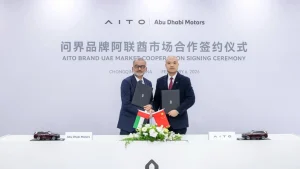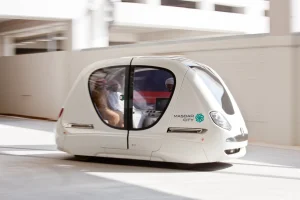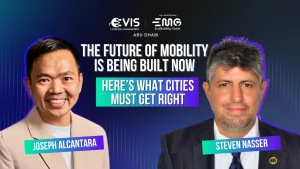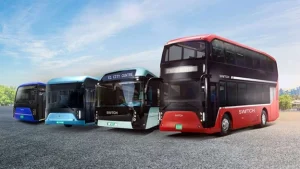For decades, Japanese cars have dominated the streets of the United Arab Emirates, celebrated for reliability, durability and strong resale value. Models like the Nissan Patrol have achieved iconic status, with many Emiratis referring to it as the country’s national car. But the market is now changing, driven by a surge in interest for hybrid and fully electric vehicles from China.
Across cities such as Dubai and Abu Dhabi, models including BYD’s Han sedan and Chery’s Jetour T2 SUV are becoming an increasingly common sight. According to Bloomberg and regional market analysts, the momentum behind Chinese brands is accelerating as automakers seek international growth amid intense price competition in China.
The Middle East has historically been a challenging environment for electric vehicles. Low fuel prices, limited charging infrastructure, and concerns about battery performance in extreme heat tempered adoption. Yet 2025 is marking a clear turning point. Chinese automakers expanded their UAE market share to an estimated 15 to 20 percent in the first nine months of the year, up from 10 to 14 percent in 2024, according to AutoData Middle East. Exports to the UAE surged by nearly 60 percent over the same period, making the country China’s second-largest destination in the region after Mexico.
“Hybrid and electric segments are experiencing explosive growth,” said Nour Abu-Safe, head of insights and analytics at AutoData Middle East. Based on registration figures and estimated market performance, around 41,000 new Chinese vehicles were sold in the UAE in the first nine months of 2025.
Consumer sentiment is contributing to the shift. Roughly two-thirds of UAE car buyers now say they would consider an EV or hybrid. Government incentives such as free parking in Dubai for electric vehicles add further appeal. Abu-Safe noted that the UAE market is less price-driven than many others and places strong emphasis on technology, quality and long-term value — areas where Chinese manufacturers are making rapid gains.
Among the most notable advancements is battery-swapping technology, introduced in the region by Nio. The company opened the Middle East’s first automated battery-swapping station this year at Abu Dhabi’s Yas Marina Circuit, enabling drivers to exchange a depleted battery within minutes. A second station is being considered for Dubai as demand grows.
BYD, meanwhile, has strengthened its presence through a partnership with Al Futtaim and is positioning itself in the mid- to upper-tier segment. “BYD aims to be the absolute leader in providing tech-driven EV and hybrid products, so pricing won’t be super cheap,” said Lucas Bellieud, managing director of BYD UAE. Executive vice president Stella Li also showcased ultra-fast charging technology in Dubai capable of adding up to 400 kilometres of range in five minutes, adapted for the region’s climate.
Despite ongoing challenges such as limited public charging availability and summer temperatures exceeding 50°C, industry forecasts remain highly optimistic. “Lower prices, advanced technology and modern designs will continue to entice customers,” Abu-Safe said.
The UAE’s EV market has already shifted significantly from Tesla’s early dominance. As reported by Charged Middle East, Chinese brands including BYD, Nio, Geely, MG and Chery now hold a growing share of the market, supported by contemporary designs, advanced driver-assistance systems and competitive pricing. Western and Japanese manufacturers are also expanding their electric offerings in the region, with Ford, BMW, Mercedes-Benz and Volkswagen accelerating their EV deployments.
China’s domestic adoption — rising from 6 percent in 2020 to more than 30 percent in 2023 — is influencing global trends, and the UAE is emerging as one of the most responsive international markets. With trade between the UAE and China surpassing USD 90 billion in 2024 and discussions underway around local assembly and industrial collaboration, the country is poised to become a regional hub for EV innovation and exports.
These developments position Chinese automakers to challenge longstanding global competitors on technology, efficiency and availability, while offering UAE consumers more choice than ever before.
The rapid rise of Chinese EVs in the UAE reflects the accelerating transformation of mobility across the region — a transformation that will be explored in depth at the 5th Edition of EVIS Abu Dhabi co-located with EcoMobility Global (EMG), taking place on 13–14 October 2026 at ADNEC Centre Abu Dhabi.








